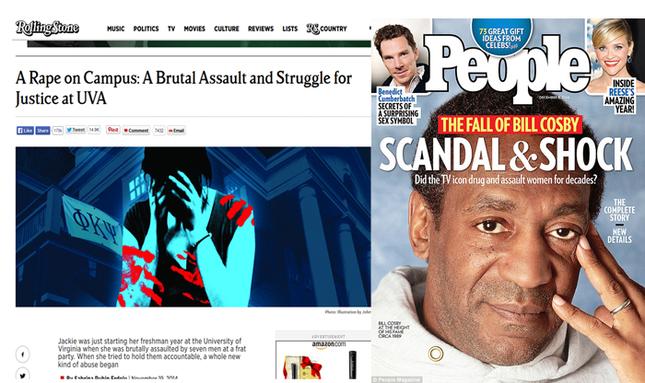What a way to end the year: Bill Cosby and the University of Virginia.
If you have been in media detox since the election, let me bring up to speed. The media has been swarmed by allegations that the avuncular and legendary comedian was less uncle and more molester. They have turned from a trickle to legacy-ending torrent with evidence apparently mounting as quickly as it is receding from the blockbuster and now infamous Rolling Stone magazine expose of on-campus rape at the hallowed halls of the college Thomas Jefferson established.
But this is less about the stories themselves and more the significance that “All Things Media” believes these two stories has for the state of American journalism and our society as a whole.
The news is “We still care!” It may seem an obvious, trite comment. While traditional journalists are bemoaning the end of journalism and Colbert is more influential than the network anchors combined, it is worth noting.
In the age of Facebook and social media where what goes for news is now curated by anarchy rather than self-appointed newsrooms, as depressing as these two stories are, there is good news. The good news is that for all the media turmoil, we as a society still want, need, value and expect what traditional journalism has always been about: factual, reliable information.
In the case of Cosby, the media has played the role of ensuring, even belatedly, that Dr. Huxtable does not escape at least some culpability – even if it is yet to play out.
However, in the case of Rolling Stone’s reportage, the key is not of calling to account of the magazine but rather that fact that we are all so outraged that this article could have been so shoddily mismanaged. In an age, when the Washington Post says that only a third of its online audience comes through its webpage and rely as much on the referral of our friends as to what we read and watch, this outrage is good.
It is good because we care. We want people to uncover stuff, and we demand that what is uncovered is accurate. It may not be in the form that traditional journalists want to see it, and it certainly won’t be from the organizations they would prefer.
As we end the year, it is nice to know that for all the dislocation of the changing media world one things hold constant: we want to know, we expect to know — and accuracy still matters.


